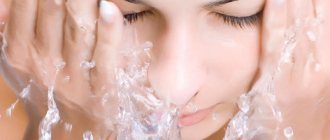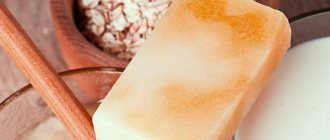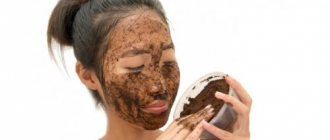Facial skin types and their characteristics ↑
Of course, our skin is complex, and it won't always fit into a certain box. There are many factors that can influence and change the condition of the epidermis, but the following guide will help you better understand the overall behavior of your skin.
This, in turn, will give you the opportunity to choose the best products and methods for caring for your face. In modern cosmetology, there are no longer 4 types of facial skin, but 5 - to the classic characteristic, a combined skin type has been added, which combines two others at the same time.
Structure of facial skin: photo
Take the online tests below and see which one is most similar to your skin!
How to understand facial skin type by its texture ↑
Pay attention to how your skin usually feels. It is important to notice how it feels on any day of the week - usually a certain type is established in youth and does not change throughout life (because if the skin suddenly begins to shine unusually or, on the contrary, looks dry, although I have always been oily - you need to change your skincare products). The texture of our skin can also tell us a lot about our skin type - that's what we'll do.
Combination skin ↑
Combination skin usually feels very oily only in the T-zone (the area that includes your forehead, nose and chin), but dry elsewhere (especially the cheeks). It can also be oily and dry in different places, but if you notice two completely opposite textures on your face, that's a sign that you're dealing with combination skin!
Sensitive skin ↑
Sensitive facial skin usually looks uneven, may become covered with red itchy spots, and becomes inflamed quickly. It does not tolerate many cosmetic products well and causes its owner a lot of trouble.
Normal skin ↑
Normal skin appears even and balanced. It's not too dry or too oily, rarely sensitive, and overall looks healthy and smooth.
Oily skin ↑
Oily skin feels oily to the touch and gets dirty very quickly. If you feel that your face is constantly shiny and glossy, and needs mattifying products and powder, then your skin is almost certainly oily.
Dry skin ↑
Dry skin feels rough and even hard to the touch. In winter, this type of skin suffers especially - cracks may even appear on the face.
Normal skin type
Characteristics of normal skin
Normal female skin has a consistently healthy beige-pink, even, moderately matte tone. In appearance, it is always clean, optimally dense and fit, young, with no defects. When touched, elastic, resilient, soft, smooth.
The number of owners of such skin is minimal; they are not familiar with such problems as enlarged pores (normally there may be a small number of slightly enlarged pores, this is not significant), acne, irritation, blackheads. The blood supply is complete, the thickness of the skin contains enough moisture and fat.
There is no peeling, the entire area of the face is matte. There may be a slight oily sheen in the T-zone, wrinkles are invisible. If you have such a face, then there is no need to overload it with cosmetics; it is better to show your natural beauty and have a much more impressive appearance. There are different types of skin aging; in this case, aging occurs slowly and evenly; external factors and hormonal changes do not affect the condition of normal skin.
Principles of caring for normal skin
Women with normal skin need to know that their skin type can change with age. For example, a polluted atmosphere and solar activity have a negative effect, so it is advisable to cleanse your face on time and use protective creams.
As the natural aging process progresses, problems may appear, such as depletion of moisture reserves or decreased sebum production. This will lead to the fact that the skin type will already be dry or oily, and these types have different features and care rules.
Women who have normal skin on their face usually have no difficulties with care, they do not need restorative cosmetics, and do not require medicinal products. After regular washing with soap, there should be no tightness or dryness. With proper care, normal skin will look flawless.
Cosmetics for the beauty of normal skin
Light scrub for normal skin
Instead of a store-bought scrub, it is good to use oatmeal along with cream, salt and butter; massage your face with this mixture for 5-10 minutes before washing.
Beauty mask for normal skin
Components:
- honey - 1 small spoon;
- wheat flour - 1 large spoon;
- egg white (raw) - 1 piece.
First, beat the egg whites and mix everything together. Apply the substance to the skin, leave for 10 minutes, remove with a cotton pad.
Creams for youthful normal skin
These products are in demand today:
- Vichy “Aqualia Thermal Leggera Cream”;
- Garnier “Custom Hydration”;
- L'Oreal L`OREAL cream-gel “Moisturizing Expert” for normal and combination skin.
How to recognize facial skin type by the appearance of pores ↑
Our facial pores can also indicate a certain type and help us decide on it, since different skin types have different pores that look different and are of different sizes. The speed of pore clogging will also play an important role here.
1. Combination skin: If the pores are large and often clogged, inflamed around the nose, but small and unnoticeable on the cheeks and other areas of the face, this is a sign of combination skin.
2. Sensitive Skin: Ladies with this type of skin often have normal to large pores. Often, after using inappropriate cosmetics, inflammation may appear, the pores become red and even itchy.
3. Normal Skin: Women with this skin type usually have almost invisible pores.
4. Oily Skin: Girls with oily skin often struggle with large pores, which get clogged easily from sweat and oil secreted by the glands. Often, the pores on the nose and T-zone change color to dark - this means that there is excess dirt and sebum in them.
5. Dry Skin: Ladies with dry skin usually have small pores that can barely be seen. They rarely become clogged or inflamed.
How to check your facial skin type: washing method ↑
Pay attention to how your skin feels after hygiene procedures and morning washing with soap. This is usually the best way to determine what type you have. 1. After thorough cleansing, combination skin in the T-zone area looks refreshed and clean; it will feel especially comfortable after washing around the nose, where there is often excess oil. However, in the cheek area, combination skin becomes dry and may even become very flaky. 2. After washing, sensitive skin temporarily calms down and looks fresher than before washing. However, soon after cleansing, irritation and redness appear, and sometimes itching. It is also often difficult for such skin to choose cosmetics for washing - most products cause discomfort and flaking.
3. Women with normal skin feel their face clean and fresh after washing their face. Sometimes there is not enough moisturizing and cream, but for the most part the face does not look tight or shiny. 4. After cleansing, oily skin looks unusually matte, clean and lacks an oily sheen - this is the only time when the face does not shine, but soon after washing the skin becomes oily again. 5. For dry skin, washing with soap is real torture. Immediately after cleansing, the face noticeably tightens, the woman feels severe discomfort and the desire to moisturize the skin with a rich cream. Some areas may even crack due to dehydration, causing a burning sensation.
Care for normal skin
Normal skin is a rarity today! This is velvety skin, glowing from the inside, without acne, without large pores, oily shine, wrinkles, dullness. Women with normal skin do not feel any discomfort and may not even use decorative cosmetics. But even such good skin needs proper care.
You need to wash your face with mild milk; try not to use soap - it dries the skin too much, which can lead to dryness. You need to wipe your face with clapping movements; under no circumstances rub your face roughly - the skin will stretch and wrinkles will appear on it. Ice cubes made from plain water or herbal infusion can be used as a tonic. Normal skin should be nourished with a light liquid moisturizer.
How to determine your facial skin type by your day cream ↑
Consider how often you need moisturizer. Almost every one of us needs such a product to keep our skin healthy and hydrated. However, how often you use a cream can directly indicate how well your face stays hydrated on its own, and what type of skin you're dealing with. 1. Women with combination skin often need to apply moisturizer to some areas of the face that look dry (usually the cheeks), but rarely need it on other oilier areas (like the T-zone). 2. Sensitive skin usually requires a moisturizer several times a day, but it is difficult to find one that does not irritate it or cause an allergic reaction.
3. Women with normal skin do not have to apply moisturizer very often during the day, as the skin remains sufficiently hydrated on its own. Usually, simple care after washing your face in the morning is enough. 4. For girls with oily skin, moisturizer often acts as an enemy - it makes the face even more shiny and shiny, causes inflammation and worsens acne. Often, oily skin does not need a moisturizer. 5. Dry skin requires a lot of nourishing product throughout the day, and this is especially necessary after waking up and after each cleansing of the face.
Do you take proper care of your facial skin?
Do you wash off your makeup before going to bed?
Night is the time when your skin repairs itself and your cells regenerate. Decorative cosmetics interfere with this process, as they literally clog the skin with free radicals and harmful substances that have reached it during the day. And they, in turn, destroy collagen.
Yes
No
Not always
What do you wash your face with in the morning?
Washing your face in the morning is one of the most important skin care rituals, as while you sleep, your skin produces sweat and sebum, which leads to breakouts and blackheads. In addition, it is important WHAT we wash ourselves with.
By water
Special care product
Soap
I don't wash my face
Which specialist should you visit at least once every six months to avoid problems with facial skin?
Unfortunately, to maintain skin in excellent condition, home treatments are not always enough. From time to time you need to contact a specialist.
Surgeon
Cosmetologist
Gynecologist
Dentist
What moisturizers should you use daily?
All skin needs daily hydration. If this is neglected, the skin will produce sebum in large quantities, which will certainly lead to problems.
Moisturizer, foundation
Tonic, moisturizer
Moisturizer, mask
How often should you change your pillowcase?
Changing your pillowcase in a timely manner prevents excess sebum and moisture from accumulating on it, which will make your face even more “rumpled” after waking up.
Once a week
Once every 5 days
Once a month
What is SPF?
We often don't even think about how important it is to use sunscreen to avoid excessive dryness and premature wrinkles.
Sun protection
Ultra-hydration
Anti-inflammatory effect
When should you use SPF?
Many girls believe that their skin only needs sun protection in summer. However, this is not true. Even in the cold season, ultraviolet radiation has a negative effect on the skin of the face.
Only in summer
In spring and summer
In any season
Always, but not in winter
What should you not do if a pimple appears?
It happens that you just want to squeeze out that terrible pimple that appeared at the most inopportune moment. But this cannot be done, since when pressure is applied, the contents also affect other areas of the skin.
Apply toothpaste
Squeeze
Treat with an anti-inflammatory agent
Why should you not wear foundation?
Just imagine the millions of germs you come into contact with every day. And then imagine rubbing them into your skin with your own fingers.
Beauty blender
Fingers
Brush
How often should you wash your makeup brushes?
If you don’t take care of your sponges and brushes, the condition of your beauty arsenal will deteriorate, which will definitely affect the quality of your makeup and your skin.
Once every 5 days
Once every 10 days
They don't need to be washed
Once a month
Why are face masks not recommended for use around the eyes?
The skin around the eyes is the thinnest and driest, therefore it is especially vulnerable and, alas, is primarily susceptible to aging. It is better to pay special attention to such troubles to daily proper care, which can help to significantly improve your appearance, postponing the need to take radical measures.
Because the mask can get into your eyes
Because the skin around the eyes requires special care
I apply and nothing!
What foods are bad for your skin?
If the eyes are the mirror of the soul, then the skin is a mirror that reflects problems in the body. But there is a way to improve the condition of the skin - with the help of a well-chosen diet.
When should you apply evening moisturizer?
If you apply the cream right before you go to bed, it will be absorbed into the pillow and not into your skin. It is better to apply moisturizers at least 40 minutes before bed.
Right before bed
2 hours before bedtime
40 minutes before bedtime
You pay close attention to the issue of self-care!
You do everything necessary to keep your skin in excellent condition even after many years!
You should spend a little more time taking care of your skin!
Everyone wants to maintain the health and elasticity of their skin. Approach the issue a little more carefully and the result will not be long in coming!
What care does each skin type need ↑
Now that you have passed the facial skin type test and managed to recognize yours, you have a general idea of your dermis structure and its needs. We offer a short guide for each category that will allow you to get rid of many cosmetic problems and make friends with your own skin!
Combined skin type ↑
Although most of us have combination skin to some degree, since around our nose we have the most sebaceous glands (pores that produce sebum) than other areas of our face, combination skin types experience this to a greater extent. If you have this particular dermis structure, then your skin is characterized by a constantly oily and shiny T-zone with simultaneous dryness in other areas of the face. How to care for it: This is the most common type of dermis, and women with combination skin should use cosmetics from different categories for different areas of the face to maintain the balance of the dermis. For example, you can use a gentle cleanser and moisturizer on your cheeks and a harsher product on your T-zone to get rid of excess oil.
Sensitive skin type ↑
Many girls mistakenly believe that they have sensitive skin. After one or two bad reactions to a cosmetic product, this phenomenon is not uncommon, and it in no way characterizes sensitive skin behavior, it happens to everyone. It may be that the product simply wasn't a good choice and wasn't suitable for your skin or contained irritating ingredients. Truly sensitive skin is easily irritated even by the safest and non-allergenic cosmetics, such as baby milk and baby cream. Against this background, a rash often flares up and develops, and red spots appear. Women with sensitive skin may experience itching, sometimes swelling and a burning sensation in the affected area. In this case, your skin also becomes red and inflamed from gusts of wind, after washing or exposure to the sun. How to care: This is the most delicate skin type that needs constant care. Find a skin care routine that suits you, making sure to try samples before purchasing and testing them in the area of your face where your skin is most sensitive. This will allow you to determine which products worsen the condition of the dermis, and which ones restore calm to it. Look for products that are mild and gentle, without fragrances or harmful or harsh ingredients such as alcohol and menthol. Avoid scrubs that contain crushed walnuts, pumice, or aluminum oxide crystals. Use only warm water to wash your face - do not cleanse your face with hot or very cold water. It is strictly forbidden to wash your face with soap!
Normal skin type ↑
Normal skin is not too dry or oily - it does not cause much trouble and is the easiest to care for. If your skin is normal, it usually has an even tone and a soft texture with small pores. In hot weather, the T-zone (the central area of your face, including your chin, nose and the part of your forehead above your eyebrows) can sometimes become shiny and shiny, but in general this area is not oily to the touch. How to care for normal skin: Light lotions and serums are ideal for your skin type because you don't need a lot of oily and heavy products to keep your epidermis balanced and healthy.
Oily skin type ↑
Women with oily skin tend to have large pores and a shiny, uneven complexion. Your skin produces more than enough sebum, so hydration is not your problem. Rather, acne and pimples are the main scourge of this skin type. If you are still not sure if you have oily skin, then pat your face with a clean, dry cloth, and if there are oily spots on it, then most likely your skin is of this type. How to care for it: It is recommended to cleanse your face and avoid heavy, nourishing creams and emollients to minimize the work of the sebaceous glands. Look for oil-free sunscreens and lotions so you don't accidentally make your face look even more shiny and shiny.
Organic cosmetics
Lately everyone has become obsessed with organic cosmetics. Consumers no longer want to see preservatives, stabilizers, thickeners and mineral oils in creams. They were replaced by wheat germ oil, squalene, various extracts and floral water.
The fashion for natural cosmetics has caused open speculation on this topic. Some manufacturers shamelessly put “eco”, “bio” and “phyto” labels on tubes, but have nothing to do with organic cosmetics.
Remember, to obtain the right to be called organic, cosmetics must undergo mandatory certification.
The most famous companies that carry it out are NaTrue, ECOCERT, COSMEBIO, Soil Association, BIO EcoCert, ICEA AIAB, BDIH. Look for them on the jar.
But if you are allergic, then it is better to avoid natural ingredients in cosmetics. In this case, the notorious mineral oil is much more suitable for facial skin care than natural oils and extracts.
How to care for your facial skin. Photo: depositphotos.com











